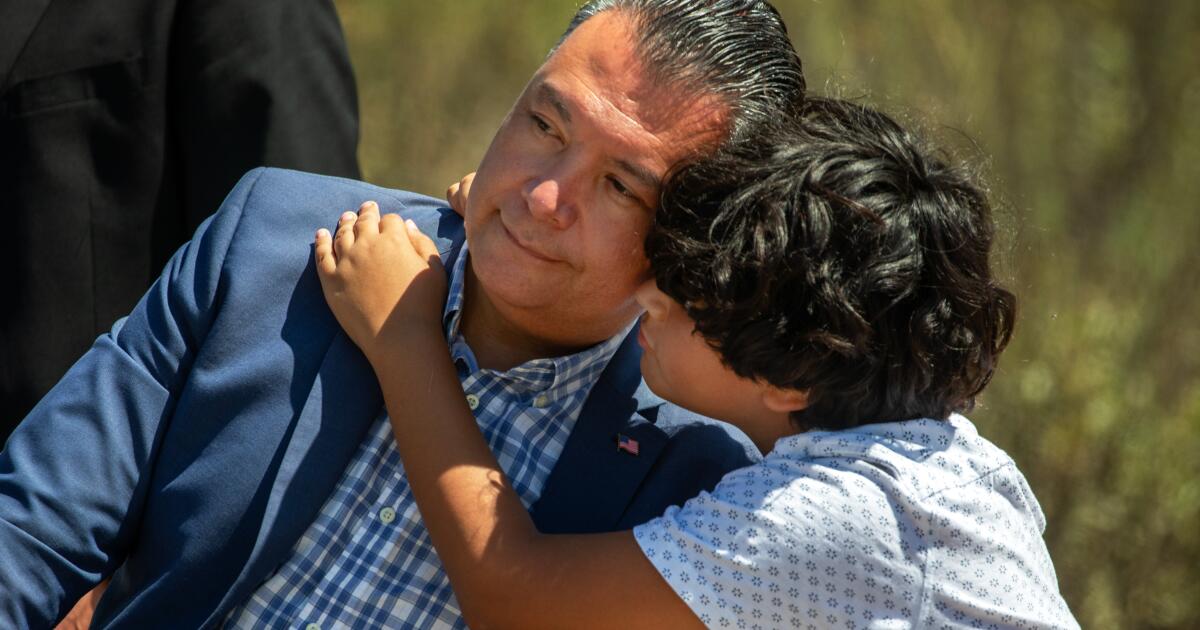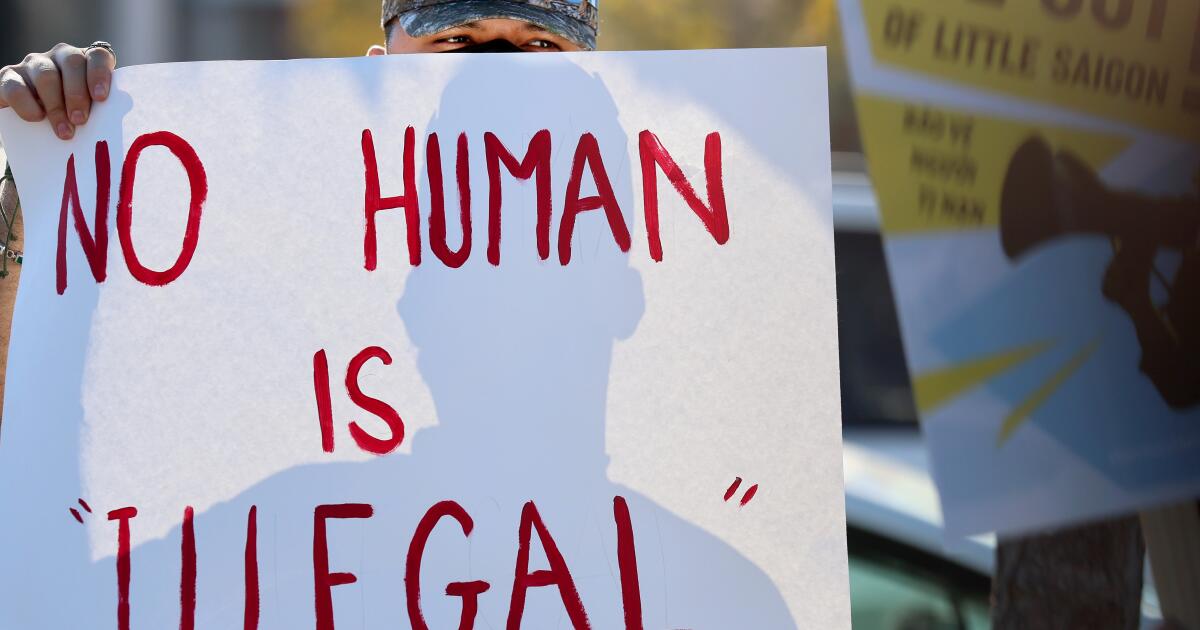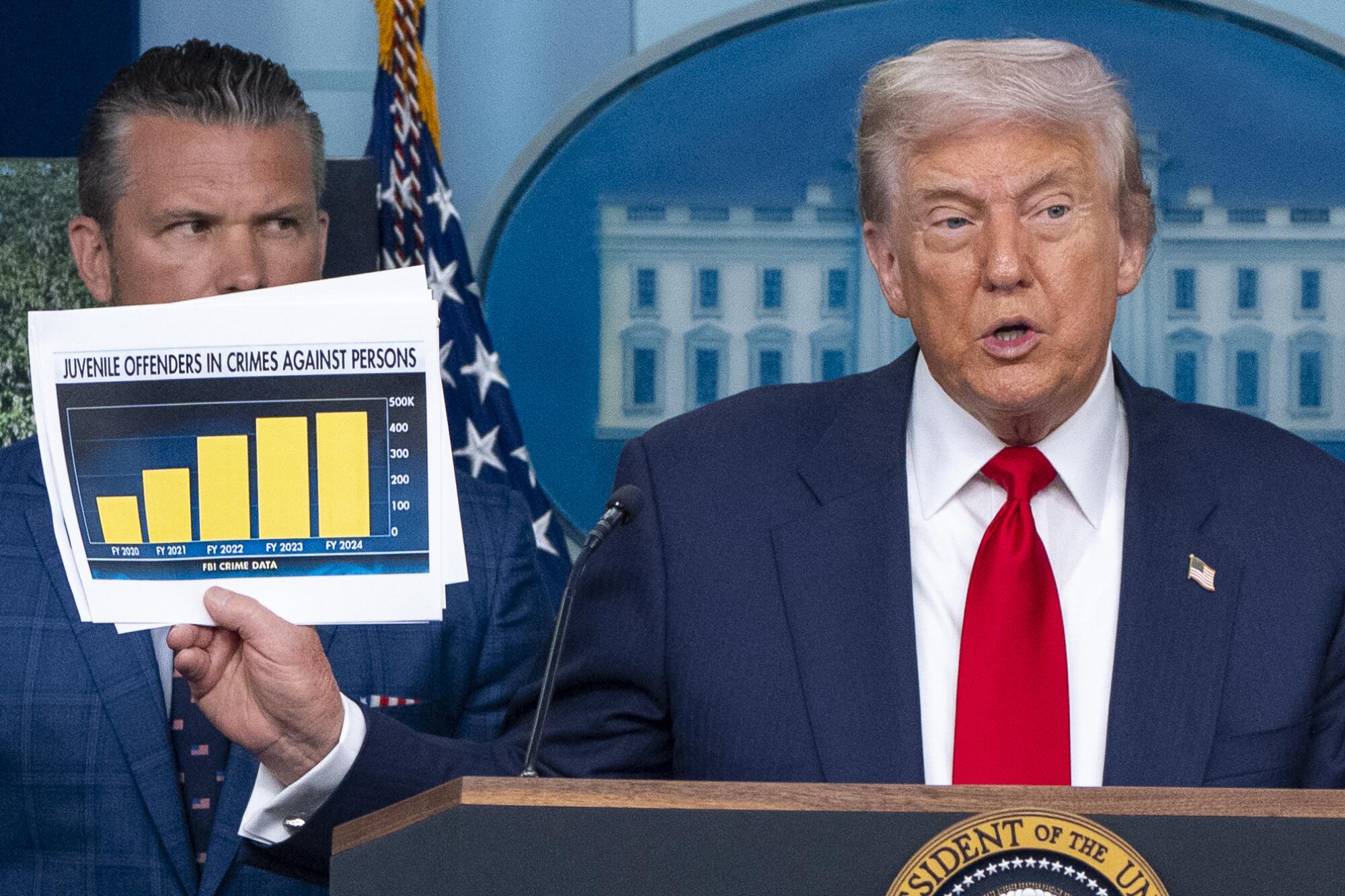Padilla pushes back in shutdown fight, warns of soaring healthcare premiums
California Sen. Alex Padilla is among the highest-ranking Latinos in U.S. politics today, but it took a pair of handcuffs to make him famous.
How’s that for a comment on America 2025?
Padilla, you may remember, was tackled and cuffed by federal officers after attempting to ask a question of Homeland Security Czarina Kristi Noem at an L.A. news conference in June, when the National Guard first made its appearance on our streets. Noem later claimed Padilla “lunged” at her — which he did not — using the classic Trumpian technique of erasing reality with blame, especially when it comes to brown people.
Padilla told me that “from day one of this administration, I have tried to speak truth to power,” and if getting tackled forced people to “have no choice but to now start paying attention … that could be helpful, because the general public knows it’s wrong.”
U.S. Atty. Gen. Pam Bondi recycled the incident on Tuesday when Padilla attempted to question her during a congressional hearing, voicing concern about the weaponization of the Department of Justice. Bondi refused to answer multiple questions, instead invoking the Noem defense.
“I find it interesting that you want order … in this proceeding now,” Bondi said. “You sure didn’t have order when you stormed Secretary Noem at a press conference in California, did you?”
Again, no storming, no lunging, not even a feint. Really, if anything can be said of Padilla, it’s that he’s a guy who likes order. An MIT-trained engineer, he’s known for being calm to the point of boring — in the best of ways. Who wouldn’t want a bit of boring in their politics today, if it’s seasoned with compassion and common sense?
Calm, of course, does not mean a lack of conviction. As the government shutdown limps to the end of its first full week, Padilla took a few minutes to fill me in on why Democrats shouldn’t back down, and why he won’t — whether the issue is healthcare, immigration or the collision of the two, which is at the heart of this shutdown.
Republicans would like voters to believe that undocumented immigrants are throwing parties in our emergency rooms, racking up free services while shoving U.S. citizens out to the sidewalk. In reality, there’s not a lot of good data on how many ER visits involve undocumented folks because doctors are more focused on saving lives than checking immigration status. But one Texas study found that about 2% of all hospital visits in a three-month period involved people without documentation. That’s in a state with a high number of undocumented folks, so take it for what it’s worth — hardly a scourge.
Padilla and Democrats would like to stay focused on an actual crisis — healthcare premiums for low- and middle-income folks are about to skyrocket in coming weeks if Congress doesn’t keep the Obama-era subsidies that make the premiums affordable. Padilla wants voters to understand how dire this is.
“This is not a what-might-happen-next-year concern … this is a now concern,” Padilla told me.
“Open enrollment is opening,” he said. “People are setting their premiums and have to make choices of where to sign up for healthcare and at the cost right now, and so it does need to be immediately addressed.”
In case you think this is partisan show, far-right MAGA cheerleader Rep. Marjorie Taylor Greene (R-Ga.) agrees with Padilla. That’s when you know things are getting weird.
“Not a single Republican in leadership talked to us about this or has given us a plan to help Americans deal with their health insurance premiums DOUBLING!!!” Greene wrote on social media, breaking with her party on the issue.
That’s about the only thing that Padilla and Greene may ever agree on. Padilla is the son of immigrants who met in L.A. and later obtained legal status. He was born in Southern California, making birthright citizenship core to his identity at a moment when Trump is asking the Supreme Court to end it. His isn’t just an immigrant story, it’s a California story, and it’s never far from his mind.
He was recently asked if he regretted fighting with the Biden administration over proposed immigration reform that lacked pathways for immigrants, especially Dreamers and others who have been in the United States for years if not decades, to become citizens. Would it have been better to sell them out, leave them in limbo, but fix the border before Trump could exploit it?
“Of course not,” Padilla told me. Rather than shrink under attack, Padilla said he’s holding his ground.
California is one of a handful of states that does in fact offer healthcare to undocumented people, though budget shortfalls forced Gov. Gavin Newsom to scale back that plan.
No federal dollars are used for that undocumented healthcare — it’s solely state money. And Padilla supports it.
“There are some states that choose to use state funding to provide that care, and I agree with that, because it’s much smarter, from a public health standpoint, to help prevent people from getting sick or treat people early on, not administer healthcare, certainly not primary care, through emergency rooms,” he said.
Padilla said it’s rich that the very workers deemed essential during the coronavirus pandemic, the workers who kept food on tables, deliveries going, and cared for our young and our elderly, are now “the primary target of Trump’s massive deportation agenda. So whether it’s in the vein of the healthcare question, whether it’s in the vein of the indiscriminate raids by ICE and other federal agencies, that’s the cruel irony.”
The Trump administration raised Padilla’s profile inadvertently, but the newfound fame has had a somewhat unexpected consequence: Frequent speculation that he may run for governor when Newsom terms out in 2026.
Padilla said he hasn’t “made a decision on that and not making any announcements right now.”
Instead, he’s focusing on helping to pass California’s Proposition 50, which would rig election maps to potentially create five more Democratic seats in the midterm elections, with the hopes of taking control of at least one house of Congress, an effort he says is “critical to reining in this out-of-control administration.”


